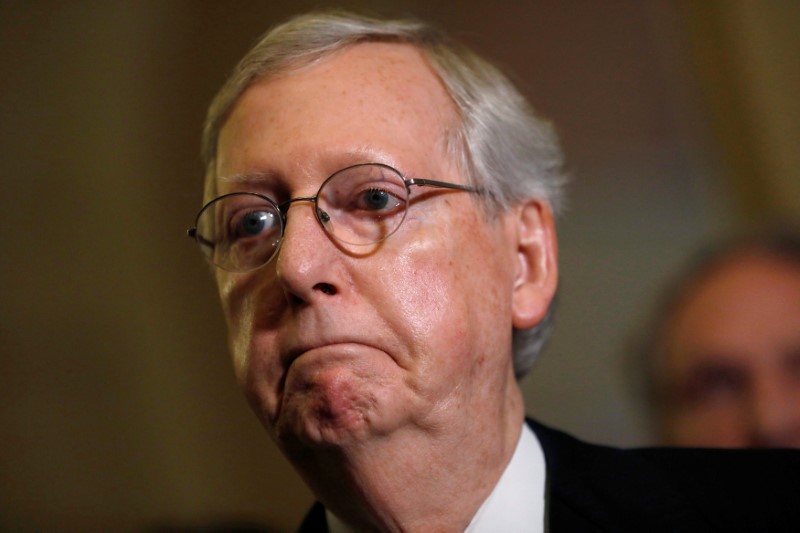By Geoffrey Smith
Investing.com -- The Senate's $1 trillion-plus coronavirus bill stalls in the face of Democratic opposition, while President Trump chafes at the extreme impact of shutdowns on the economy. Stocks are set to open lower in frustration at the delay. German Chancellor Angela Merkel is in self-isolation but her government is set to cast aside a decade of austerity with a record deficit in its new budget. Calls for the euro zone to consider joint bonds increase, and Big Oil is scaling back its capital spending but not its dividends. Here's what you need to know in financial markets on Monday, March 23rd.
1. House Democrats stall McConnell's $1 trillion package
The Senate’s ‘phase 3’ package of economic support measures for the U.S. economy stalled after running into resistance from House Democrats. A procedural vote on the package, originally scheduled for Sunday evening, has accordingly been rescheduled to midday eastern time, according to various reports.
The bill has a sticker value of well over $1 trillion, including a reported $50 billion earmarked for the stricken airline industry.
On Sunday, St. Louis Fed President James Bullard told Bloomberg he thought U.S. economic activity could halve in the second quarter as activity shuts down.
President Donald Trump again expressed impatience with the effect of public health measures on the economy, tweeting that “WE CANNOT LET THE CURE BE WORSE THAN THE PROBLEM ITSELF” and promising a review of the administration’s current advice within a couple of weeks.
2. Euro zone to meet amid calls for it to take giant leap with 'Corona bonds'
EU finance ministers are set to hold another teleconference on Monday ahead of a Eurogroup meeting on Tuesday, amid growing calls for the currency union to issue joint debt instruments to share the burden of supporting the economy through the Covid-19 crisis.
Portugual's central bank Governor Carlos Costa on Monday followed Italian Prime Minister Giuseppe Conte in calling for the bloc to issue jointly-guaranteed debt, a proposal that was repeatedly resisted by the likes of Germany and the Netherlands during the last euro crisis.
Germany itself is set to end a decade of austerity this week with a new emergency budget that envisages a deficit of around 156 billion euros and total support measures for the economy of over 1 trillion ($1.07 trillion)
The Ifo research institute estimated a hit to the German economy of some 730 billion euros from the pandemic.
3. Signs of a slowdown in new Covid-19 cases in Europe; U.S. picture unclear
The rate of growth in new Covid-19 infections across Europe appeared to slow, albeit the overall numbers of both infections and deaths continue to rise alarmingly.
At the weekend, Europe’s largest economy, Germany, imposed a two-week ban on all non-essential meetings of more than two people, while Chancellor Angela Merkel went into self-isolation after having contact with a doctor who subsequently tested positive for the Covid-19 virus.
Elsewhere, Spain extended its emergency lockdown regime by another two weeks to early April while the U.K. reportedly pondered stricter measures to enforce its hitherto relaxed steps to encourage social distancing.
Analysts at Pantheon Macroeconomics said the rate of new infections also appears at first sight to be slowing in the U.S., but warned that the incompleteness of testing data made it impossible to say for sure. Chief economist Ian Shepherdson noted that New York City data are probably more reliable than national data. "The number of cases per million is now much higher than in Italy, and, at 941 yesterday, it will soon shoot above Hubei's 1,185," he wrote in a note to clients.
4. Stocks set to open lower amid ongoing signs of liquidity squeeze
U.S. stocks are set to open lower on disappointment at Congress’s failure to pass the latest economic support bill, amid ongoing signs of liquidity stresses in various asset classes.
By 6:30 AM ET (1030 GMT), the Dow Jones 30 Futures contract was down 504 points, or 2.7%, while the S&P 500 Futures contract was down 2.7% and the Nasdaq 100 futures contract was down 2.3%.
Overnight, risk assets had trended down in both Europe and Asia, but declines were mostly orderly.
However, signs of dysfunction in markets continue to pop up, with the Financial Times reporting that Goldman Sachs (NYSE:GS) had to intervene to support liquidity in two of its money market funds, while reports also circulated of various Scandinavian funds suspending redemptions.
The reports suggest that central bank efforts over the last two weeks to keep markets functional haven’t been entirely successful.
5. Big Oil cuts back
Royal Dutch Shell (LON:RDSa) and Total (PA:TOTF) both suspended their stock buyback programs and announced big cuts to capital expenditure to conserve cash.
However, both companies left their dividends intact for the time being.
In the U.S., meanwhile, The Wall Street Journal reported that Occidental Petroleum (NYSE:OXY) is set to appoint two representatives of activist investor Carl Icahn to its board, ending a bitter struggle over the company’s direction as it struggles with a heavy debt load after last year’s acquisition of Anadarko.
Crude oil futures resumed their declines, WTI falling 0.5% to $22.50 a barrel and Brent falling 4.1% to $25.87.
